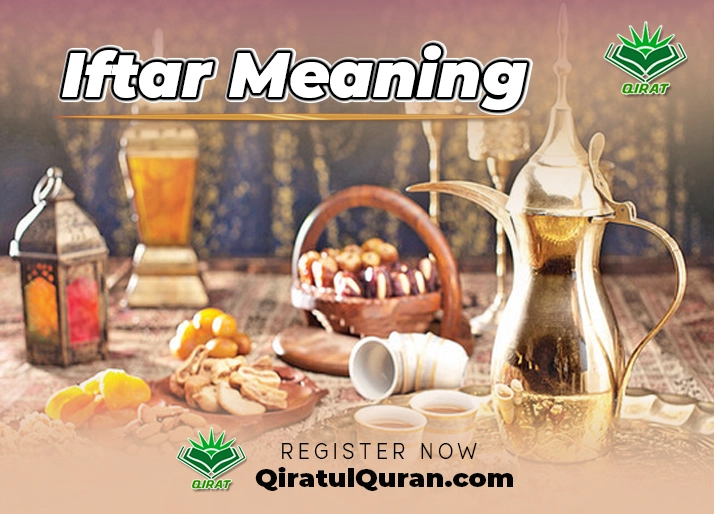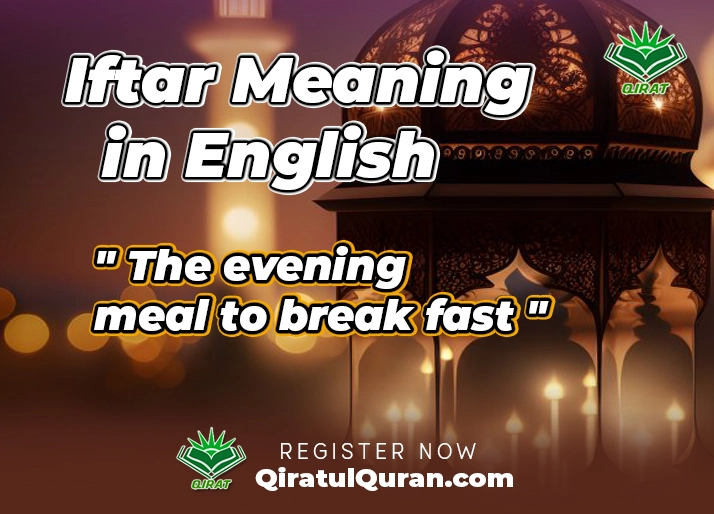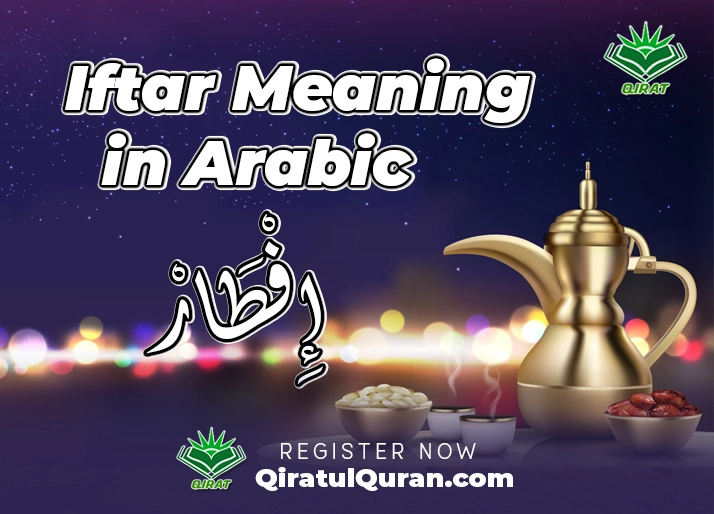
What is the Meaning of Iftar?
Iftar Meaning, Iftar refers to the evening meal with which Muslims end their daily fasting during the Islamic month of Ramadan. This is the religious observance of Ramadan and is often done as a community, with people gathering to break their fast together.
Iftar Meaning in Islam
In Arabic, the word “iftar” means “breakfast.” In the context of Islam and Ramadan, iftar specifically refers to the evening meal consumed after fasting all day during Ramadan. Iftar is one of the most important aspects of observing the Ramadan fast in the Islamic faith.
Eating iftar ends the day’s fast and is considered incredibly spiritually rewarding. In Islam, gathering together as a community or with friends and family to break the fast is also greatly encouraged. Iftar helps remind Muslims to be thankful for Allah’s bounty on Earth that provides them sustenance and to be mindful of those who are less fortunate and may not have food or water.
Iftar Meaning in English

In English, iftar can be translated as “the evening meal to break fast” during Ramadan. The word comes directly from the Arabic term for breakfast, emphasizing that iftar is the first meal eaten after fasting from sunrise to sunset.
Some English speakers may also use the term “break-fast” in place of iftar to refer to the evening meal concluding the Ramadan fast. However, the term iftar is more common and recognizable.
Iftar Meaning in Arabic

In Arabic, “iftar” translates to “breakfast.” The literal meaning is “the breakfast meal.”
During Ramadan, iftar takes on a religious significance as the meal with which Muslims conclude their daily fasting. However, outside of Ramadan, iftar can refer to any morning meal or breakfast a Muslim may eat.
Here is the term “iftar” written in Arabic script: إفطار
Suhoor and Iftar Meaning
Suhoor refers to the early morning meal Muslims eat before beginning their fast for the day during Ramadan. Iftar is the evening meal with which Muslims break their fast.
Therefore, suhoor takes place early in the morning before dawn, and iftar is eaten after sunset in the evening. Eating suhoor gives Muslims important energy and nutrition to sustain them throughout the day when they abstain from all food and drink during daylight hours. Iftar then allows them to replenish and feed themselves after going without food or water for the entire day.
Suhoor and iftar are intrinsically connected as the two meals bookending the daily fasting rituals during Ramadan.
Zakat Iftar Meaning
Zakat refers to the religious obligation for Muslims to give to charity and help needy people. It is one of the Five Pillars of Islam.
During Ramadan, many Muslims choose to pay zakat by organizing or donating to iftar meals that feed poor people in their community. Wealthier Muslims see providing iftar meals to less fortunate community members as a meaningful way to pay zakat.
Therefore, “zakat iftar” refers to charity iftar meals funded by zakat donations and organized to feed poor Muslims during Ramadan. This allows them to participate in the iftar rituals even if they cannot afford their evening meal for breakfast.
What is the Meaning of Iftar Food?
Iftar foods refer to the dishes and meals traditionally eaten by Muslims to break their fast during Ramadan. While iftar can involve any food, there are certain dishes and types of cuisine strongly associated with iftar meals across Muslim communities.
Popular iftar foods include dates, water, juices, salads, yogurt and milk drinks, soups, and digestive foods like fiber-rich dishes or fritters that are easy to eat after a day of fasting. Hydrating foods like watermelon, cucumber, and other fruits are also common.
These foods help replenish nutrients, rehydrate the body, and restore energy levels after going without food or drink for many hours. They prepare the digestive system to function normally again.
Why Do Muslims Eat Iftar?
Muslims eat iftar meals to conclude their daily fasting during the holy month of Ramadan. Fasting during Ramadan is one of the Five Pillars of Islam and is done to commemorate the first revelation of the Quran to the Prophet Muhammad S.A.W.
Eating iftar ends the period of fasting for the day. Muslims believe great spiritual rewards come from fasting during Ramadan and feeding oneself properly again at sunset. Gathering together for Iftar also encourages community and charity.
Additionally, iftar gives Muslims an opportunity to be thankful for blessings like food, water, and good health. It also fosters empathy for people living in poverty who may not have provisions to end a fast.
What is Iftar in Muslims?
Iftar is the evening meal eaten by Muslims to break their fast during Ramadan. Eating dates and drinking water or juice to break the fast is considered a sunnah, or practice of the Prophet Muhammad.
The iftar meal begins immediately after the Maghrib evening prayer, which signifies the end of fasting for the day. Iftar itself comprises the foods, drinks, or dishes eaten at this evening meal to celebrate and reflect on completing another day of fasting.
In many Muslim communities, believers gather together with family or friends to share in the iftar meal and participate in charity or reflection on the blessings of life.
Why is Iftar Important?
Iftar is important for multiple reasons in Islam:
- Spiritually, iftar concludes a day of great religious devotion when Muslims fast to grow closer to Allah and learn self-discipline. Eating iftar and reciting prayers to break the fast is a rewarding ritual.
- Physically, iftar allows Muslims to nourish themselves and rehydrate after many grueling hours without food or water, recharging their bodies.
- Socially and culturally, gathering for iftar strengthens community and family bonds. Iftar is a time of charity and unity among Muslims.
- Educationally, iftar reminds Muslims to be grateful for Allah’s provisions on Earth that allow billions of people to eat every day. It fosters empathy for the needy people.
What Foods to Avoid at Iftar?
Although iftar is meant to replenish nutrients after fasting all day, it’s important not to overeat heavy or fatty foods right away. This can upset the stomach and digestive system at rest all day.
Here are some foods Muslims aim to avoid when breaking their Ramadan fast:
- Excessive sugary foods. Consuming too many sweets can cause blood sugar spikes and a lack of proper nutrition.
- Very spicy, fried, or greasy dishes that may irritate the stomach.
- Large portions of rice, bread, and pasta take longer to digest.
- Overindulging in caffeine or acidic fruit juices can disrupt digestion.
Instead, Muslims focus on hydrating foods like water, yogurt, and fiber-rich fruits and vegetables to slowly return their bodies to functioning normally again.
Why Eat Dates After Fasting in Iftar?
Breaking the Ramadan fast by eating a few dates is a long tradition going back to the days of the Prophet Muhammad S.A.W used to break his fast this way.
There are also health and practical reasons why Muslims eat dates at iftar after a day of fasting:
- Dates are nutrient-rich and provide a boost of natural sugar, proteins, fibers, and other beneficial properties like antioxidants. This makes them excellent at energizing the body again.
- The sweet nature of dates is soothing and delivers an initial burst of energy that revives Muslims after hours of fasting.
- Dates are traditionally easy to access in Middle Eastern communities where Islam began. They store well and provide a convenient means to break fast anywhere.
In essence, breaking fast with dates has both religious precedent and health advantages that make them perfectly suited for use in iftar meals after a long day of abstaining from food and drink.
Note: To Learn Quran Online Look into our Online Quran courses.


